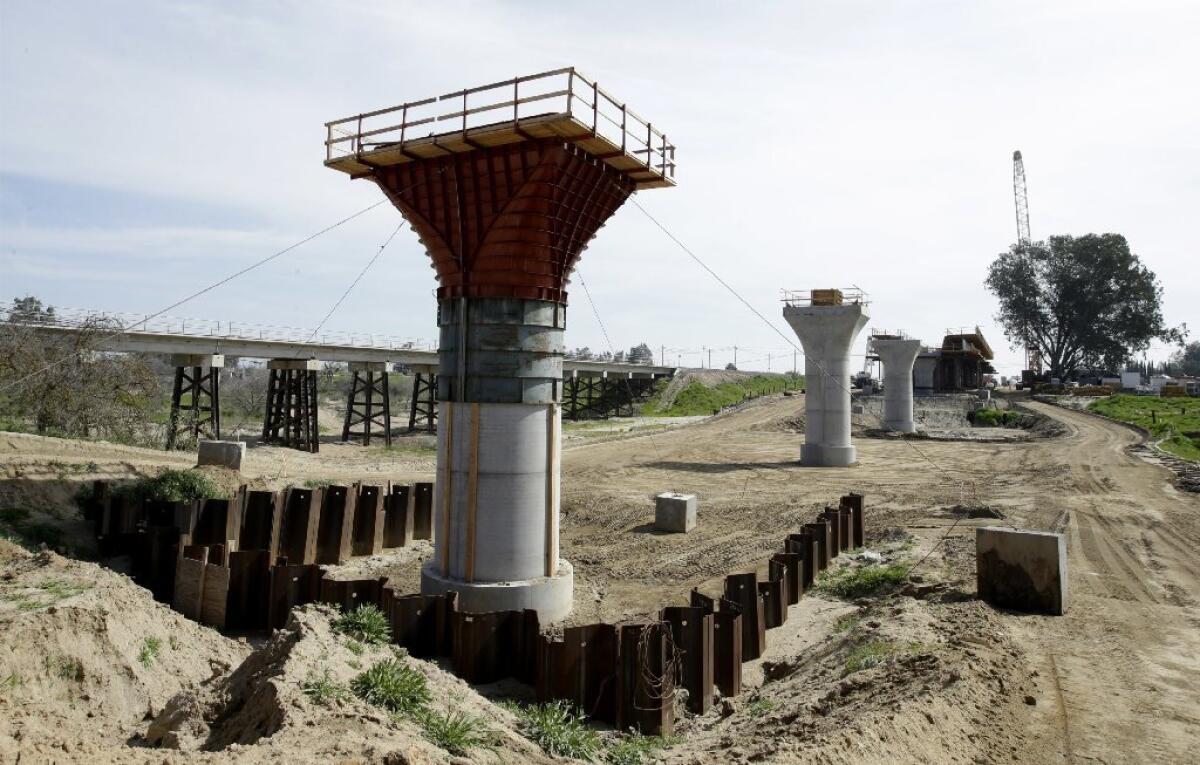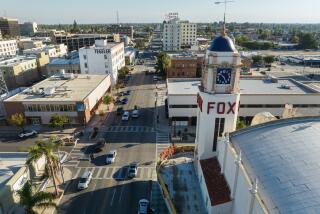State rail authority will seek a $35-million increase for key project in bullet train plan

Relocation of Highway 99 in Fresno, a key part of the bullet train project, is over budget, behind schedule and will cost millions of dollars more to complete, officials said Monday.
The highway project would move a 2.5-mile stretch of the roadway, the principal commercial artery of the Central Valley, to make room for high-speed rail tracks through Fresno. The project currently is running 15% over budget and has fallen about six months behind schedule.
Work has been held up by litigation over obtaining rights to private property, the same issue that has contributed to a more than a two-year delay in building the first 29 miles of rail in the Central Valley.
The California High-Speed Rail Authority is planning Tuesday to seek a $35-million increase in state funding from the original $226 million, which was granted to Caltrans in 2013. State Department of Transportation documents indicate that the full amount needed is $50 million, but the agency would seek to find $15 million in cost reductions by narrowing the scope of the project.
“The scope reductions are items that we look at to save money on a project, such as using asphalt versus concrete, taking a look at aesthetics, etc.,” said Caltrans spokesman Matt Rocco.
The rail authority board will consider the cost increase at its board meeting Tuesday, along with a separate request for an additional $200 million for improvements to a Bay Area commuter rail system that were part of a 2013 agreement to make early investments in the so-called bookends of the rail system. The $64-billion bullet train project would carry passengers from Los Angeles to San Francisco.
The original agreement called for the rail authority to invest $600 million to help Caltrain, the Northern California commuter rail line, electrify its tracks, but the cost is now $713 million with an additional $84 million for other work. The rail authority also has increased similar funding for Southern California projects by several hundred million dollars.
The cost increases could put additional burdens on the state’s plan to build an initial operating system from San Jose to Shafter by 2025, which will take virtually all of the potential funding the Legislature, federal agencies and taxpayers have pledged over the last eight years. Critics say the project is at risk of shifting into a series of local rail investments that might never connect into a statewide system.
In June, the rail authority board approved a $63-million increase in the contract for Tutor Perini, the Sylmar-based firm that is building the first 29 miles of rail structures. The company asserted the state had failed to deliver land parcels on schedule, costing it additional overhead and idle machinery charges.
The Tutor change orders added 17 months to the company’s work schedule, which may give Caltrans some breathing room. The Highway 99 project has used up 61% of its allowable time, but only spent 36% of its funding, suggesting it has to speed construction to avoid further delays. Rail authority spokeswoman Lisa Marie Alley said Caltrans was originally supposed to complete work by June 2018, but now the deadline is December 2018.
“This does not impact the overall construction schedule or budget for the first construction segment in the Central Valley,” she said.
The land acquisitions have proved to be far more contentious than the rail authority ever considered. The Central Valley was touted as the easiest place to start construction, but wealthy farmers were more prepared, more passionate and tougher in resisting state demands.
Caltrans has obtained 31 of the 42 parcels, but has encountered delays in getting court-ordered possession in many cases. It has had to invoke eminent domain against Union Pacific for four parcels, according to an authority audit report.
More to Read
Start your day right
Sign up for Essential California for news, features and recommendations from the L.A. Times and beyond in your inbox six days a week.
You may occasionally receive promotional content from the Los Angeles Times.







